 I don’t know Kate Angelo, the writer of “The Back-Up Plan,” but after seeing the movie, it would appear that she’s never been pregnant, and doesn’t know anyone who has ever been pregnant. There isn’t a single note in this movie that rings true, resorting to cartoonish portrayals of the pregnant woman stereotype (they throw up, they get cravings, their hormones are out of whack) for cheap laughs. When they get really desperate, they cut to a shot of Jennifer Lopez’s dog.
I don’t know Kate Angelo, the writer of “The Back-Up Plan,” but after seeing the movie, it would appear that she’s never been pregnant, and doesn’t know anyone who has ever been pregnant. There isn’t a single note in this movie that rings true, resorting to cartoonish portrayals of the pregnant woman stereotype (they throw up, they get cravings, their hormones are out of whack) for cheap laughs. When they get really desperate, they cut to a shot of Jennifer Lopez’s dog.
Author: David Medsker
Movie Review: Trolls
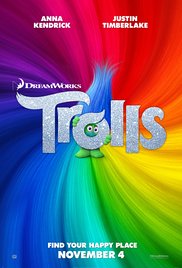 A movie about Troll Dolls is almost comically cynical. Take a product line that has lost its luster, repackage it to the next generation, laugh all the way to the bank. It’s the textbook definition of a cold, calculated, brand-driven cash grab. If that sounds familiar, it’s because that is exactly what people said about “The LEGO Movie” before it came out. Then that movie turned out to be awesome, and the nation ate a fair amount of crow.
A movie about Troll Dolls is almost comically cynical. Take a product line that has lost its luster, repackage it to the next generation, laugh all the way to the bank. It’s the textbook definition of a cold, calculated, brand-driven cash grab. If that sounds familiar, it’s because that is exactly what people said about “The LEGO Movie” before it came out. Then that movie turned out to be awesome, and the nation ate a fair amount of crow.
Movie Review: Inferno
 It’s been seven years since the world last saw a film based on author Dan Brown’s renowned symbologist Robert Langdon. The last installment, “Angels & Demons,” had a worldwide box office gross nearly $300 million less than its predecessor, “The Da Vinci Code.” That sounds bad, but to be fair, “Angels” still took in nearly half a billion dollars, so even if the idea of a Langdon film in 2016 seems unthinkable for a number of reasons (time, diminishing returns), money clearly did most of the talking when it came to green lighting the latest film, “Inferno.” And for a while, the movie distances itself from the first two films thanks to a breakneck opening pace, only to turn into the Dan Browniest Dan Brown adaptation to date halfway through, and grind to a screeching halt.
It’s been seven years since the world last saw a film based on author Dan Brown’s renowned symbologist Robert Langdon. The last installment, “Angels & Demons,” had a worldwide box office gross nearly $300 million less than its predecessor, “The Da Vinci Code.” That sounds bad, but to be fair, “Angels” still took in nearly half a billion dollars, so even if the idea of a Langdon film in 2016 seems unthinkable for a number of reasons (time, diminishing returns), money clearly did most of the talking when it came to green lighting the latest film, “Inferno.” And for a while, the movie distances itself from the first two films thanks to a breakneck opening pace, only to turn into the Dan Browniest Dan Brown adaptation to date halfway through, and grind to a screeching halt.
Movie Review: The Girl on the Train
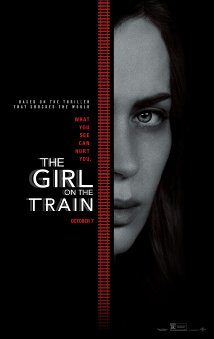 Paula Hawkins’ “The Girl on the Train” instantly drew comparisons to Gillian Flynn’s “Gone Girl” thanks to the use of multiple viewpoints, but let’s make something clear: as enjoyable as “Train” was to read, it doesn’t come close to plumbing the emotional depths that Flynn wrote into the truly psychotic Amy Dunne. At the same time, this works in the favor of the film version of “Girl on the Train.” Erin Cressida Wilson’s script puts a higher percentage of the source material into the film (the one thing book fanatics complain about the most), and the story’s main obstacle (recovering a lost memory) is a tried and true film device. Ask anyone who saw “Jason Bourne” earlier this year.
Paula Hawkins’ “The Girl on the Train” instantly drew comparisons to Gillian Flynn’s “Gone Girl” thanks to the use of multiple viewpoints, but let’s make something clear: as enjoyable as “Train” was to read, it doesn’t come close to plumbing the emotional depths that Flynn wrote into the truly psychotic Amy Dunne. At the same time, this works in the favor of the film version of “Girl on the Train.” Erin Cressida Wilson’s script puts a higher percentage of the source material into the film (the one thing book fanatics complain about the most), and the story’s main obstacle (recovering a lost memory) is a tried and true film device. Ask anyone who saw “Jason Bourne” earlier this year.
Movie Review: Storks
 “Storks” is filled with sweet and funny moments, but it has two teensy weensy (read: massive) problems: a lot of the funny bits are stolen, and there is no story. Like, at all. It’s actually kind of impressive how far out of his way screenwriter Nicholas Stoller went to not come up with a coherent story, and then you remember that he’s written some funny movies that had a story (the two most recent Muppets films, for starters), and that’s when the feeling of being cheated sets in.
“Storks” is filled with sweet and funny moments, but it has two teensy weensy (read: massive) problems: a lot of the funny bits are stolen, and there is no story. Like, at all. It’s actually kind of impressive how far out of his way screenwriter Nicholas Stoller went to not come up with a coherent story, and then you remember that he’s written some funny movies that had a story (the two most recent Muppets films, for starters), and that’s when the feeling of being cheated sets in.
Movie Review: The Light Between Oceans
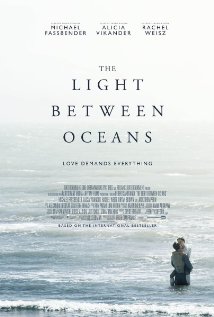 In the summer of 2011, I had a brief gig with a gigantic movie database, tagging films with certain key words. Under the ‘Plot’ category was my favorite tag: “Hide the Body!” It brings to mind movies like “Very Bad Things,” “I Know What You Did Last Summer,” and “Shallow Grave,” films where someone dies under gruesome or mysterious circumstances, and the remaining characters keep the death a secret because it benefits them somehow. “The Light Between Oceans,” a period piece set off the western coast of Australia, is a Hide the Body movie. Gotta say, didn’t see that coming.
In the summer of 2011, I had a brief gig with a gigantic movie database, tagging films with certain key words. Under the ‘Plot’ category was my favorite tag: “Hide the Body!” It brings to mind movies like “Very Bad Things,” “I Know What You Did Last Summer,” and “Shallow Grave,” films where someone dies under gruesome or mysterious circumstances, and the remaining characters keep the death a secret because it benefits them somehow. “The Light Between Oceans,” a period piece set off the western coast of Australia, is a Hide the Body movie. Gotta say, didn’t see that coming.
This aspect of the plot wreaks havoc on the rest of the story, too. Try as they might to make a tasteful art film about love and betrayal – and for a few stretches, they succeed – the thriller angle of the story disrupts the tone once it comes to the forefront. There is clearly a lot going on between the ears of the main characters – grief has many layers – but very little of it is translated on screen for the viewer.
Movie Review: Don’t Breathe
 Director Fede Alvarez’s previous film, the 2013 remake of “Evil Dead,” is considered the bloodiest movie of all time. (I prefer the word ‘sinewy,’ as it was needlessly, almost laughably gory, but oh well.) His latest film “Don’t Breathe” appears to be an attempt at karmic payback of sorts, because he’s downright stingy with the corn syrup this time around, and the film is better because of it. It’s a claustrophobic thriller; it doesn’t need to be bloody. Indeed, Alvarez has multiple opportunities to shed blood on screen (if Mel Gibson is directing, you’re seeing that blood), but resists. This is a good thing.
Director Fede Alvarez’s previous film, the 2013 remake of “Evil Dead,” is considered the bloodiest movie of all time. (I prefer the word ‘sinewy,’ as it was needlessly, almost laughably gory, but oh well.) His latest film “Don’t Breathe” appears to be an attempt at karmic payback of sorts, because he’s downright stingy with the corn syrup this time around, and the film is better because of it. It’s a claustrophobic thriller; it doesn’t need to be bloody. Indeed, Alvarez has multiple opportunities to shed blood on screen (if Mel Gibson is directing, you’re seeing that blood), but resists. This is a good thing.
Movie Review: Hell or High Water
 “Hell or High Water” is one magnificently self-aware film. There is a strong Coen Brothers vibe to both the plot and the dialogue (if “Blood Simple” and “Fargo” were forced to mate, the offspring would turn out a lot like this), which is why the casting of Jeff Bridges is a stroke of genius. As a Coen veteran, he understands the material, and is able to not just humanize a character that would be monstrous in the hands of a lesser actor – he’s able to make the character charming and likable.
“Hell or High Water” is one magnificently self-aware film. There is a strong Coen Brothers vibe to both the plot and the dialogue (if “Blood Simple” and “Fargo” were forced to mate, the offspring would turn out a lot like this), which is why the casting of Jeff Bridges is a stroke of genius. As a Coen veteran, he understands the material, and is able to not just humanize a character that would be monstrous in the hands of a lesser actor – he’s able to make the character charming and likable.
Movie Review: Jason Bourne
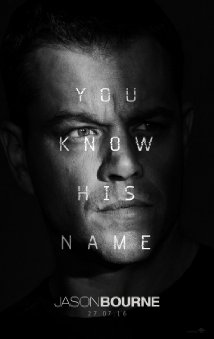 There are film franchises where each installment comes with a checklist of the beats the film will hit. A chase, a shot, a musical cue, as line of dialogue, a plot device, those sorts of things. “Jason Bourne” takes that idea to an absurd level. This is a film where the audience isn’t just reminded that they’re watching a Bourne film (though they are, constantly); at times, they’re watching a featurette on the making of a Bourne film. Several scenes are staged in such a manner that they look like test runs of the final shot, rather than the final shot. The plot is rather threadbare for a series that prides itself on convoluted story lines, but the most damning thing about “Jason Bourne” is what a bloodless, cold viewing experience it is. From start to finish, I was not emotionally invested in a single thing that took place. In fact, I couldn’t wait for it to be over, definitely a first for a Bourne film.
There are film franchises where each installment comes with a checklist of the beats the film will hit. A chase, a shot, a musical cue, as line of dialogue, a plot device, those sorts of things. “Jason Bourne” takes that idea to an absurd level. This is a film where the audience isn’t just reminded that they’re watching a Bourne film (though they are, constantly); at times, they’re watching a featurette on the making of a Bourne film. Several scenes are staged in such a manner that they look like test runs of the final shot, rather than the final shot. The plot is rather threadbare for a series that prides itself on convoluted story lines, but the most damning thing about “Jason Bourne” is what a bloodless, cold viewing experience it is. From start to finish, I was not emotionally invested in a single thing that took place. In fact, I couldn’t wait for it to be over, definitely a first for a Bourne film.
Movie Review: Lights Out
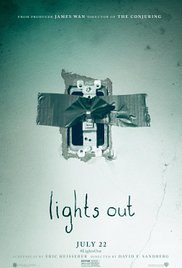 Had “Lights Out” been released after “The Ring,” it might be considered one of the all-time greats of supernatural horror. It has a genuinely creepy (if slight) premise, courtesy of a relentless, unstoppable villain, and several blood-chilling scenes. The film’s biggest problem is that it doesn’t trust its stuff, falling for the cliché trick of needlessly filling the score with crashing, ‘Boo!’ punches of percussion, when the movie was already perfectly scary. Director David F. Sandberg would have been wise to take a page from executive producer James Wan’s “Conjuring” films, and let the camera do the talking, rather than the score.
Had “Lights Out” been released after “The Ring,” it might be considered one of the all-time greats of supernatural horror. It has a genuinely creepy (if slight) premise, courtesy of a relentless, unstoppable villain, and several blood-chilling scenes. The film’s biggest problem is that it doesn’t trust its stuff, falling for the cliché trick of needlessly filling the score with crashing, ‘Boo!’ punches of percussion, when the movie was already perfectly scary. Director David F. Sandberg would have been wise to take a page from executive producer James Wan’s “Conjuring” films, and let the camera do the talking, rather than the score.



